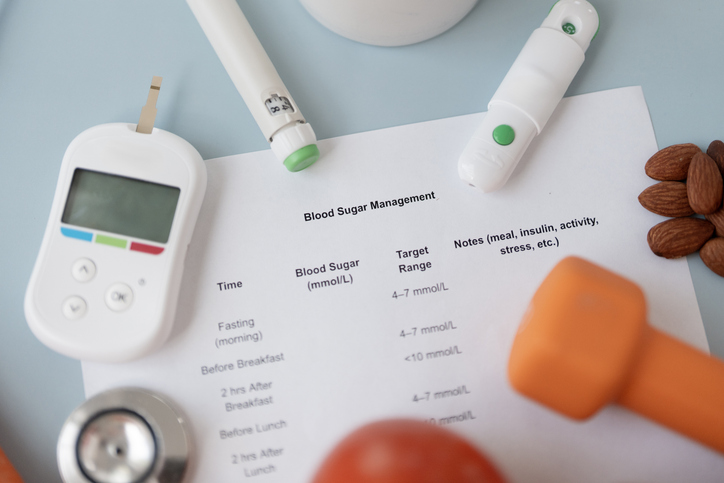Insulin Pump and Continuous Glucose Monitoring
Insulin Pump and Continuous Glucose Monitoring
Insulin Pump and Continuous Glucose Monitoring
Insulin pumps are small devices that deliver insulin. If you’re struggling with diabetes care, wearing one can help you manage your blood sugar.
Our Carilion Clinic endocrinologists can help you get an insulin pump and continuous glucose monitor. We offer the latest versions of popular tethered and tubeless (patch) devices, including Tandem, Medtronic and Omnipod.
Insulin pumps are small devices that deliver insulin. If you’re struggling with diabetes care, wearing one can help you manage your blood sugar.
Our Carilion Clinic endocrinologists can help you get an insulin pump and continuous glucose monitor. We offer the latest versions of popular tethered and tubeless (patch) devices, including Tandem, Medtronic and Omnipod.
An insulin pump gives your body insulin on its own using settings programmed by your doctor. If you have diabetes, it can help you manage your blood sugar. It’s mostly for type 1 diabetes, but some people with type 2 may also need insulin.
Wearing an insulin pump is an alternative to insulin injections.
The pump is a small device about the size of a deck of cards. You wear it outside of your body or as a patch on your skin. The pump works with your continuous glucose monitor to deliver the insulin you need, when you need it.
Your doctor programs the insulin pump to give you the right amount of insulin. Or, you can dose your insulin manually.
There are two main types of pumps: tubed and tubeless. In a tubed pump, you get the insulin through a small tube under your skin in your belly or upper hip area. For a patch or tubeless pump, the device punctures the skin where it’s attached to deliver insulin directly.
People who wear insulin pumps work carefully with a diabetes care team to set up and manage the pump.
Types of pumps Carilion offers
Each type of insulin pump has pros and cons. When you work with Carilion, our team will talk to you about the best fit for you.
Insulin pumps need to be FDA-approved. The FDA has approved some of these pumps for kids, which you can access through our pediatric endocrinology program. Others are only approved for adults.
The technology is always changing and Carilion works to stay current. We offer a range of insulin pumps, including the Tandem, Medtronic and Omnipod models.
What Is an Insulin Pump?
An insulin pump gives your body insulin on its own using settings programmed by your doctor. If you have diabetes, it can help you manage your blood sugar. It’s mostly for type 1 diabetes, but some people with type 2 may also need insulin.
Wearing an insulin pump is an alternative to insulin injections.
The pump is a small device about the size of a deck of cards. You wear it outside of your body or as a patch on your skin. The pump works with your continuous glucose monitor to deliver the insulin you need, when you need it.
Your doctor programs the insulin pump to give you the right amount of insulin. Or, you can dose your insulin manually.
There are two main types of pumps: tubed and tubeless. In a tubed pump, you get the insulin through a small tube under your skin in your belly or upper hip area. For a patch or tubeless pump, the device punctures the skin where it’s attached to deliver insulin directly.
People who wear insulin pumps work carefully with a diabetes care team to set up and manage the pump.
Types of pumps Carilion offers
Each type of insulin pump has pros and cons. When you work with Carilion, our team will talk to you about the best fit for you.
Insulin pumps need to be FDA-approved. The FDA has approved some of these pumps for kids, which you can access through our pediatric endocrinology program. Others are only approved for adults.
The technology is always changing and Carilion works to stay current. We offer a range of insulin pumps, including the Tandem, Medtronic and Omnipod models.
People with diabetes who need insulin replacement may be good candidates for an insulin pump.
The first step is continuous glucose monitoring. Recording your glucose levels will help fine-tune treatment. From there, we can add a pump if it’s a good fit for you.
You might talk with your doctor about an insulin pump if you:
- Struggle to get your insulin dosing correct
- Have frequent low blood sugar readings
- Exercise regularly, and like the idea of continuous insulin, versus having to stop and manually give yourself insulin
- Have gastroparesis, a condition that makes it harder to absorb food from your stomach
- Have a strong aversion to needles
- Are planning to get pregnant
Using an insulin pump is a personal choice. You can also manage it well with injections. An insulin pump doesn’t need to be a permanent thing. You can go off-pump as needed, such as during vacation.
Is an Insulin Pump Right for Me?
People with diabetes who need insulin replacement may be good candidates for an insulin pump.
The first step is continuous glucose monitoring. Recording your glucose levels will help fine-tune treatment. From there, we can add a pump if it’s a good fit for you.
You might talk with your doctor about an insulin pump if you:
- Struggle to get your insulin dosing correct
- Have frequent low blood sugar readings
- Exercise regularly, and like the idea of continuous insulin, versus having to stop and manually give yourself insulin
- Have gastroparesis, a condition that makes it harder to absorb food from your stomach
- Have a strong aversion to needles
- Are planning to get pregnant
Using an insulin pump is a personal choice. You can also manage it well with injections. An insulin pump doesn’t need to be a permanent thing. You can go off-pump as needed, such as during vacation.
Every day, insulin pumps help people manage their diabetes and get the insulin they need.
Insulin pumps aren’t a “cure” for diabetes. But they can be a great tool. Managing your blood sugar is the first step to a healthier life.
Before getting an insulin pump
You’ll start by meeting with your diabetes care team. You’ll talk about whether a pump is right for you. If you decide it is, your care team will help you choose the right type and model.
At Carilion, we’ll help you through insurance approvals and other paperwork.
You’ll work directly with our Certified Diabetes Care and Education Specialist to learn:
- How the pump works
- How to program it
- How to troubleshoot it
- How to fill it with insulin, insert the infusion set and connect the pump
- How often to change your infusion set (every 2 - 3 days)
- How to change your pump’s batteries
Using your insulin pump
Your doctor will calculate your insulin doses, whether you need continuous insulin or mealtime doses.
In the first few days and weeks, you can expect to need to adjust the settings.
As you transition from shots to the pump, you’ll monitor your glucose carefully. We’ll be checking in with you often during the first few weeks.
It’s crucial to make sure you know the signs of blood sugar that’s too high or too low. If your pump stops working, you need to be ready. This usually means having needles and insulin close by at all times.
What Should I Expect With an Insulin Pump?
Every day, insulin pumps help people manage their diabetes and get the insulin they need.
Insulin pumps aren’t a “cure” for diabetes. But they can be a great tool. Managing your blood sugar is the first step to a healthier life.
Before getting an insulin pump
You’ll start by meeting with your diabetes care team. You’ll talk about whether a pump is right for you. If you decide it is, your care team will help you choose the right type and model.
At Carilion, we’ll help you through insurance approvals and other paperwork.
You’ll work directly with our Certified Diabetes Care and Education Specialist to learn:
- How the pump works
- How to program it
- How to troubleshoot it
- How to fill it with insulin, insert the infusion set and connect the pump
- How often to change your infusion set (every 2 - 3 days)
- How to change your pump’s batteries
Using your insulin pump
Your doctor will calculate your insulin doses, whether you need continuous insulin or mealtime doses.
In the first few days and weeks, you can expect to need to adjust the settings.
As you transition from shots to the pump, you’ll monitor your glucose carefully. We’ll be checking in with you often during the first few weeks.
It’s crucial to make sure you know the signs of blood sugar that’s too high or too low. If your pump stops working, you need to be ready. This usually means having needles and insulin close by at all times.
Insulin pumps are a safe way to manage your diabetes. However, they do come with a few risks:
- Too much or too little insulin: This is usually because of incorrect settings.
- Pump malfunction: Sometimes infusion sets come loose or tubing kinks up.
- Skin irritation: You may have redness, itching or irritation at your insertion site.
- Technology burnout: Pumps require daily care. Without it, you can wind up with an infection or getting the wrong dose.
Your diabetes care team will talk with you about how to manage all of these risks.
Insulin Pump Risks
Insulin pumps are a safe way to manage your diabetes. However, they do come with a few risks:
- Too much or too little insulin: This is usually because of incorrect settings.
- Pump malfunction: Sometimes infusion sets come loose or tubing kinks up.
- Skin irritation: You may have redness, itching or irritation at your insertion site.
- Technology burnout: Pumps require daily care. Without it, you can wind up with an infection or getting the wrong dose.
Your diabetes care team will talk with you about how to manage all of these risks.
At Carilion, we help people manage their diabetes and other endocrine conditions every day. We offer the latest treatments and technology close to home.

Researching new treatments
Our partnership with Virginia Tech Carilion School of Medicine means we’re always researching new ways to treat diabetes and improve care. We even conduct research focused on people with diabetes in southwestern Virginia.
Why Choose Carilion Clinic?
At Carilion, we help people manage their diabetes and other endocrine conditions every day. We offer the latest treatments and technology close to home.
Health and Wellness

Helping Your Child Adapt to Life With Type 1 Diabetes

Lifestyle Medicine: Positive Changes, Powerful Results

The 4 M's of Diabetes Management
Get Care at Carilion Clinic
Treating the people of western Virginia for more than 70 years, we're proud to continue bringing the latest endocrine treatments to our community. We're working to make it easier than ever to connect with us and find the care you need.
Get Care at Carilion Clinic
Treating the people of western Virginia for more than 70 years, we're proud to continue bringing the latest endocrine treatments to our community. We're working to make it easier than ever to connect with us and find the care you need.
Get Care at Carilion Clinic
Treating the people of western Virginia for more than 70 years, we're proud to continue bringing the latest endocrine treatments to our community. We're working to make it easier than ever to connect with us and find the care you need.
Get Care at Carilion Clinic
Treating the people of western Virginia for more than 70 years, we're proud to continue bringing the latest endocrine treatments to our community. We're working to make it easier than ever to connect with us and find the care you need.

